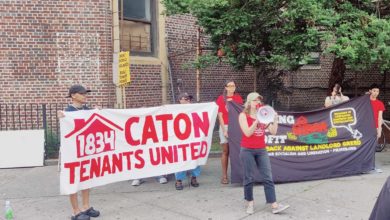The homeless and working poor of Richmond, Va., may soon find themselves further relegated to the bottom of society. Poor people in Richmond often gather in Monroe Park, a public park, to receive free meals from various church and social justice groups. Members of the city government and nearby Virginia Commonwealth University, however, plan to end this by renovating Monroe Park in a manner that would force the homeless into further despair.
 Coalition fights to keep free meals (above) in Monroe Park. |
The renovation plans involve closing the entire park via a large fence for 9 to 18 months. During the $6.2 million renovation process, a café and fancy walkways, among other things, will be installed. This will privatize the park. Once finished, a private security force will be hired to remove “homeless appearing” people. The poor and the feeding programs would then be relocated to Richmond’s Conrad Center. The staunchest supporter of this plan is city councilman Charles R. Samuels, who previously drew controversy by co-sponsoring a noise ordinance that was declared unconstitutional.
The groups that feed the poor in the park have argued that relocating to the Conrad Center is not an option, because it is isolated. Located in a valley with steep hills, miles away from temporary employment agencies and reliable public transportation, the Conrad Center is almost impossible to access for people with physical disabilities. It is also ominously overlooked by a jail and is on arsenic-poisoned ground.
Groups that advocate for the homeless have contended that closing the entire park would force the homeless into the hostile VCU community, where they are more likely to be arrested for “trespassing” by unsympathetic campus police. With an incarceration rate well above the national average and a city jail with conditions declared “unconstitutionally harsh” by the ACLU, they have argued that the petty charges from the cops would risk the lives and health of the homeless. It is also worth noting that an inmate died over the summer due to negligence on the part of the jail.
The Monroe Park Campaign, a coalition of social justice and religious groups, has worked hard to limit the renovation plans.
“We do not oppose the renovations,” said Kendall, a Monroe Park Campaign activist. “We just believe that it should be done in two or more stages to accommodate the people and services already using it.”
“We would just like to see the renovations done in stages, leaving at least 25% of the park open at all times,” said campaign member Nathan Stickel. “We also oppose private management of the park.”
The Campaign also opposes the installation of private security and demands that feeding programs remain allowed in Monroe Park.
Councilman Samuels held a public forum last month to make the feeding groups find an alternative area, but the attendees all concluded there was no alternative to Monroe Park.
“It is central and easy to access, with much less police harassment than the surrounding neighborhoods,” said Stickel.
Samuels has so far refused to take the demands of the Campaign into consideration.
The park renovation plans reflect the priorities of the capitalist system expressed on a local level. Under capitalism, the interests of private business take precedence over meeting the needs of the poor. Under socialism, people would not need to go to a public park to get a free meal, affordable housing would be a right, and parks would be there to serve the recreational needs of all the people.





